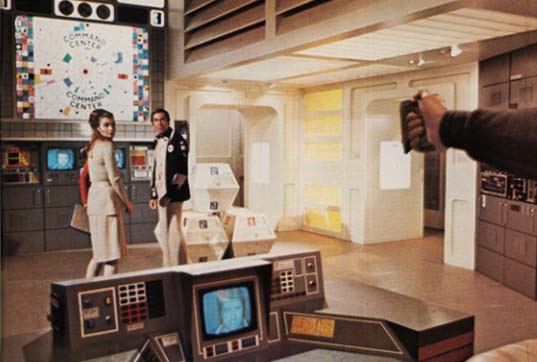
"Seance Spectre" explored the effects of the long confinement within Alpha's sterile environment.
| wrong. SL: How did the changes in Barbara Bain's character come about? FF: When I had spoken on the phone to Bar- bara, whom I had never met, she was charm- ing and delightful. I said, "Barbara, why don't you do that in the series?" Her training at the Actor's Studio in New York told her: Be economical, which was all wrong for the type of show. I tried to give her more to do. I tried to give her some sense of humor because she's a natural in social situations. She's sharp. She knows story and character very well. Marty [Landau] was a delight, an excellent actor and fun on the set. . .he tells beautiful stories. I have great respect for Marty and Barbara, but I think science-fiction should have young faces. SL: Why was the character of Sandra seen sporadically in Year II? FF: Zienia Merton, who played Sandra, wanted more to do and was offered a job somewhere else, so we lent her out for several episodes and brought in the character of Yasko, director Ray Austin's wife. We kept Nick Tate. Nick was very nervous when Tony Anholt came in, and always had his agent on us. We tried to use everybody. The New York office told us to drop Tate; I said no, it would be wrong. SL: Tell us about other changes for 1999's second year. FF: We cut down the whole vast control |
center. . .cut down the loss of Eagles. I felt if we were going to use violence of that sort. . . use it meaningfully. The English, when they did these shows, desperately wanted to reach the American market, since that's where all the money is. And they would interpret "ac- tion" literally as ation--shooting down a million Eagles. . .blasting away and doing wild physical things. . .instead of dramatic action. . .conflict. These are tough concepts for them to be able to understand and accept. SL: Overall, what were the problems with 1999, as you saw them? FF: They were doing the show as an English show, where there was no story, with the peo- ple standing around and talking. They had good concepts, they have a wonderful charac- ters, but they kept talking about the same thing and there was no plot development. 1999 opened extremely well in the United States and then went right down the tubes. There was nobody you cared about in the show. Nobody at all. The people themselves didn't care about each other. I did a whole thing where I at least had a scene where some- body said, "My God! He's gonna be hurt! Is he dead? Is he alive?" They just didn't do that. In the first show I did, I stressed action as well as character development, along with strong story content, to prove that 1999 could stand up to the American concept of what an action-adventure show should be. Abe Man- |
dell was pretty nervous, but we were well- receivedbythereviewers.Afewofthemsaid, "Gee, the show is vastly improved, but it's too late to save it." SL: Why were there no American guest stars on 1999? FF: British union rules. Marty and Barbara are both Americans. Even when I came over, they had to get special dispensation for me. For there to be an American guest star, I think there would have been big problems with the unions. SL: Were you able to use any American writers? FF: I was allowed six American writers, but in answer to your question, no. I didn't want to work from 3,000 miles away. SL: Were you getting acceptable scripts from the British writers? FF: At the beginning of the season you're very fussy about scripts, but as the year goes on and you reach 18 or 20 episodes, the stuff that looked terrible to you at the beginning starts to look like pure gold. I would explain things to the English writers very care- fully--because I was sensitive to their feel- ings--how the script should be written for the American viewer. They were very cooperative, very creative. There were several English plot stuctures I came across that I felt weren't right for us (mostly in terms of character), for an action-type series. As a tele- vision series producer, if you do 24 one-hour |
 |